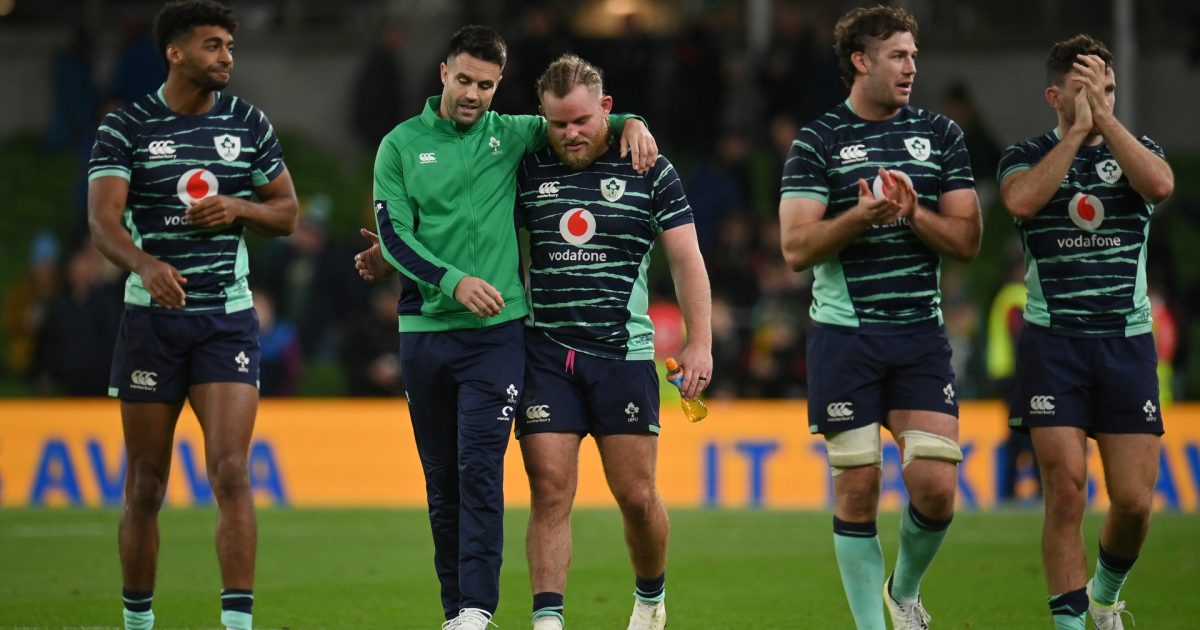Real deal Farrell and the prop that 'never looked like budging'

Andy Farrell has certainly become the real deal as the Ireland head coach in recent times. Whereas initially he was shackled by the inheritance of the Joe Schmidt era, that conservatism is very much a thing of the past and he has very much become his own boss man.
Fifteen wins in the last 17 matches is quite the smash hit record compared to his early teething difficulties, the winning of just six of eleven matches, a run that culminated in the back-to-back February 2021 defeats to Wales and France which left Ireland enduring their worst start to a Six Nations campaign since the old Five Nations was back in 1998.
Add in the bluntness of the attack under the baton of Mike Catt and the portents were grim. Fast forward 21 months, though, and all has utterly changed. Irish creativity is flourishing, a fresh style of play has evolved, players are performing like they definitely having fun, and the Aviva Stadium is again packed to the rafters after the bleakness of closed doors pandemic.
The good times are certainly rolling for Ireland and an unexpected upside is that Farrell is now also talking a very good game. Previously, he was a hard listen, his observations usually being trite and limited and doing little to promote what his Ireland were about.
Winning, though, has bred a steely confidence where the insight is far more illuminating and his ‘lovely fella’ personality is finally starting to shine through. It may have taken six years to publicly emerge, given that it was 2016 when he first went on the IRFU payroll, but better late than never.
The way Farrell now excitedly talks about his Ireland team is infectious. Take Saturday night in Dublin with the Springboks the latest victim on the Irish cull list. Resilience, guts and character were three pique-the-interest words used within seconds of Farrell beginning his reflections on an inspired performance that consolidated Ireland’s current world No1 ranking. Culture, attitude and unbelievably proud were other descriptions to soon follow in the same opening answer.
He’s right – this is indeed an XV to be giddy about. Just don’t ask him about the World Cup and the quarter-final glass ceiling that everyone will now expect Farrell’s Ireland team to shatter. “We’re not going to get into that, we’re miles off it,” he dismissively uttered when quizzed on the prospect of meeting the Springboks in ten months’ time in their pivotal pool match in Paris.
Too right. There are more pressing concerns before then with two further games to be played in this Autumn Nations Series followed by the 2023 Guinness Six Nations. What can be talked about more willingly is the Irish depth situation.
You still have to be concerned regarding what is behind talisman Johnny Sexton. Joey Carbery was restricted to a two-minute cameo on Saturday that mainly involved booting the ball into the stands to signal full-time, while Ciaran Frawley had a Friday night to forget in the No10 shirt with the filleted Ireland As.
More encouragingly, though, there were lesser-known names outside of the usual high-performing suspects who vaulted into the limelight versus the Springboks. Look at Finlay Bealham, someone who had a start to forget two years ago against Georgia but who now has involvement in a series win over the All Blacks and a victory over South Africa to savour.
“Finlay coming on, he has grown in confidence every single time he takes the field at international level,” enthused Farrell about Saturday’s half-time replacement for the jarred ankle Tadhg Furlong. “I thought his scrum was excellent. He was dynamic, nice and low and never looked like budging. We are delighted for him. He has grown in confidence week by week.”
And what about the excellent 27 minutes played by the unfortunately injured Stuart McCloskey, a player shelved by Schmidt only for Farrell to have a soft spot for him? “He was doing really well, he was being himself, he was strong, he was getting us over the gain line, he was calm because his character is that way as well.
“He was having a great game up until that point,” beamed the coach about the midfielder who was only promoted to the starting XV on Friday when Robbie Henshaw went lame but he went on to play like he was a Test veteran. Add in now rookie Jimmy O’Brien went so smoothly off the bench – it was certainly a prosperous fact-finding mission.
And yet, the show won’t stop there. Not with the likes of the ‘dead leg’ Sexton cajoling Farrell and aiming for even better and better judging by the skipper’s criticism of some of his Ireland team’s play against the South Africans.
“Just some of the execution – they rush and pressure you when you have got the ball and it’s about staying calm and getting the ball into the space and a couple of passes didn’t go to hand. Things like that are where we can be better…”

























